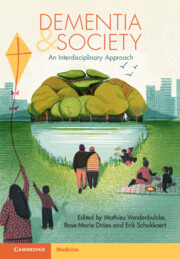Book contents
- Dementia and Society
- Dementia and Society
- Copyright page
- Contents
- Contributors
- Additional material
- Preface
- Chapter 1 Different Perspectives on Dementia
- Chapter 2 From History to Intervention
- Chapter 3 Personhood, Identity and Autonomy
- Chapter 4 Living Meaningfully with Dementia
- Chapter 5 Quality of Life of Persons with Dementia
- Chapter 6 Living with Dementia
- Chapter 7 Informal Care for Persons with Dementia
- Chapter 8 Risk Factors and Non-Pharmacological Prevention of Dementia
- Chapter 9 An Empowering Dementia Environment
- Chapter 10 The Impact of the COVID-19 Pandemic on the Well-Being of People Living with Dementia
- Chapter 11 Care Planning and the Lived Experience of Dementia
- Chapter 12 Societal and Ethical Views on End-of-Life Decisions in Dementia
- Chapter 13 Driving and Dementia
- Chapter 14 Social and Private Costs of Dementia
- Index
- References
Chapter 13 - Driving and Dementia
Published online by Cambridge University Press: 26 May 2022
- Dementia and Society
- Dementia and Society
- Copyright page
- Contents
- Contributors
- Additional material
- Preface
- Chapter 1 Different Perspectives on Dementia
- Chapter 2 From History to Intervention
- Chapter 3 Personhood, Identity and Autonomy
- Chapter 4 Living Meaningfully with Dementia
- Chapter 5 Quality of Life of Persons with Dementia
- Chapter 6 Living with Dementia
- Chapter 7 Informal Care for Persons with Dementia
- Chapter 8 Risk Factors and Non-Pharmacological Prevention of Dementia
- Chapter 9 An Empowering Dementia Environment
- Chapter 10 The Impact of the COVID-19 Pandemic on the Well-Being of People Living with Dementia
- Chapter 11 Care Planning and the Lived Experience of Dementia
- Chapter 12 Societal and Ethical Views on End-of-Life Decisions in Dementia
- Chapter 13 Driving and Dementia
- Chapter 14 Social and Private Costs of Dementia
- Index
- References
Summary
Most people with early-stage dementia lead relatively independent lives and many remain active drivers for several years after diagnosis. Independent mobility and driving are important features of their quality of life and enable the individual to continue living at home, thus reducing the financial burden on society. However, dementia-associated cognitive impairment can impact the ability to drive safely. This leads to a potential conflict between the individual’s autonomy and the safety of other road users. Regulations concerning drivers with dementia differ across countries, and clinical assessment procedures to determine fitness to drive differ within and across countries. No single examination method can classify a driver as safe or unsafe with complete certainty. Once a person with dementia has been cleared for driving, regular follow-up is necessary to determine when driving should cease. Clinical experience shows that the issue of driving is sensitive for cognitively impaired people and caregivers. Even a severely impaired person may react strongly when learning that driving is no longer permitted, as this represents a threat to his or her self-esteem as well as a practical challenge. This needs to be recognized and dealt with appropriately in the healthcare context, presenting and discussing alternative modes of transportation.
Keywords
- Type
- Chapter
- Information
- Dementia and Society , pp. 251 - 266Publisher: Cambridge University PressPrint publication year: 2022



